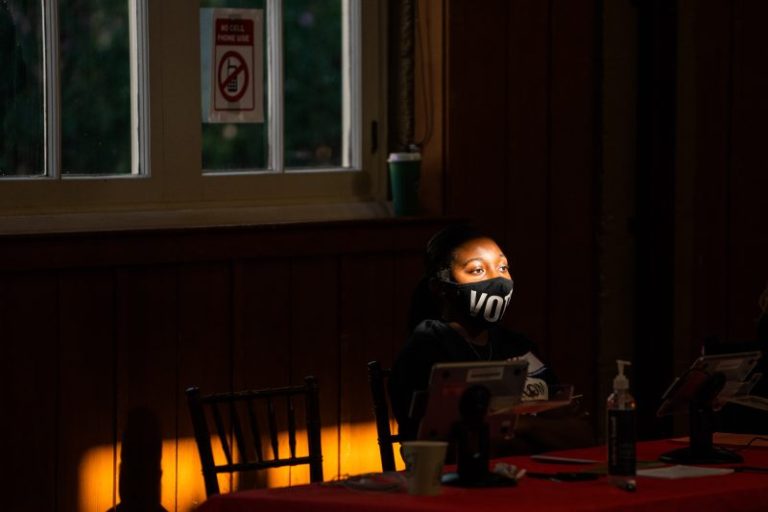Election Day 2022 could be a drawn-out affair: 3 of the 4 most crucial Senate races — the ones that may prove decisive for control of the chamber — could take days to count all their votes or, in the case of Georgia, potentially require a December runoff.
But we should have a good sense of which direction the wind is blowing relatively early. For those who might not be up for pulling an all-nighter like we will, here are some early races to monitor, along with what they might tell us.
As noted, it’s possible this could be headed for a runoff, and 2020 showed us that things can change significantly at that point. So we might not know the winner tonight or even this week. But it’s still worth keeping a close eye on in the meantime — both because a winner tonight would be pivotal, and because it’s likely to be one of the first Senate races in which we have extensive results.
The polls close at 7 p.m. Eastern, and Georgia counts its votes relatively quickly (though vote totals from redder, rural areas will come in first, which could be misleading).
Unlike some other races in which the GOP candidate has closed a significant gap in recent months, this one has polled tight throughout. There is some evidence that Republican candidate Herschel Walker has gained toward the end, but that’s generally shown up in lower-quality and GOP-aligned polls.
If Sen. Raphael G. Warnock (D-Ga.) is looking like he could force a runoff or even win, that would go a long way toward assuring Democrats that they might just hold their 50-50 Senate majority. If a flawed candidate like Walker wins, though, it’s difficult to see how Democrats would hold on. Republicans would basically be able to put things on ice with just one more win in Arizona, Nevada, New Hampshire or Pennsylvania.
This, unlike Georgia, is one of those races in which the GOP candidate has made up some major ground in the polls. Don Bolduc was down nearly nine points to Sen. Maggie Hassan (D-N.H.) in the FiveThirtyEight polling average in early October, and the race had been somewhat forgotten, but he’s now within the margin of error in most late polls.
The voting closes in New Hampshire between 7 p.m. and 8 p.m. Eastern, depending on the area, and the counting is likely to be slower there than in Georgia. But when it comes to an early race that could test how much fringier candidates can take advantage of a good environment, you’d struggle to find a better one. (GOP Gov. Chris Sununu once dismissed Bolduc as “not a serious candidate.”)
Republicans can still win the Senate without Bolduc, but if he’s seriously threatening to unseat Hassan, it’s probably going to be a good election for the GOP.
This one won’t affect the Senate majority, but it’s very much along the lines of New Hampshire when it comes to what it will say about the overall environment. And with almost all of the biggest governor’s races either taking place further west or featuring polls that close later, this is the one to watch early on.
Gov. Gretchen Whitmer (D) has long been a pretty popular governor, and she appeared to get a major break when the GOP nominated Tudor Dixon, a former commentator for fringe conservative media. But as in New Hampshire, the race has closed substantially.
It’s not looking quite as close as New Hampshire, but if Dixon can compete with Whitmer — say, keep it within the low single digits — Democrats could be in for a very difficult election.
Almost all of the polls close at 8 p.m. Eastern, and in 2020, 94 percent of the vote was counted on election night. (Things were prolonged because it was close, but the race was called for President Biden by early Wednesday morning.)
Indiana and Kentucky feature some of the earliest poll closing times in the country, with much of those two states closing by 6 p.m. Eastern.
That’s too early! But it does mean we can look to them to get some of the earliest indicators of how the election is going. And in the House, the one race in these two states that’s competitive is Indiana’s 1st district, where Rep. Frank J. Mrvan (D-Ind.) is trying to ward off a challenge from Republican Jennifer-Ruth Green. (Many of the polls in this northwest Indiana district actually close at 7 p.m., but that’s still one of the earliest poll-closing times in the country for a key House race.)
The district went for Biden by more than eight points, but it’s considered a toss-up by handicappers, with Green closing strong. If Green wins, it probably confirms that Democrats will lose the House by a clear margin and relatively early (as is expected).
Plenty of eyes will be on neighboring Virginia, where the polls close at 7 p.m. Eastern and three key districts are in play. But the vote-counting will probably be faster south of the border in North Carolina’s very swingy and vacant 13th district — 99 percent of North Carolina votes were counted on Election Day in 2020 — and it’s got one of the earliest poll closing times for a pure toss-up race.
This race features a young former football player who has described himself as a “MAGA warrior,” Bo Hines, against a more-seasoned Democratic candidate in state Sen. Wiley Nickel — a dynamic that parallels many of the biggest races in the country.
Republicans should win this kind of seat if they’re going to have a big night, but keep an eye on the margin. And if Democrats win, that’ll give them plenty of hope elsewhere, given that this district closely matched the 2020 election results. (Also keep one eye trained on the bluer 1st and 6th districts which, if at all competitive, could signal a very bad night for Democrats.)

